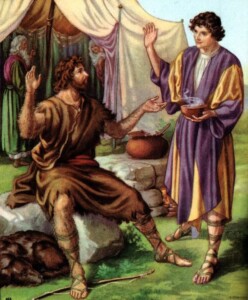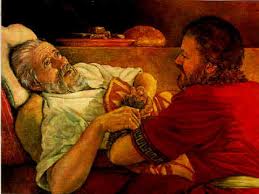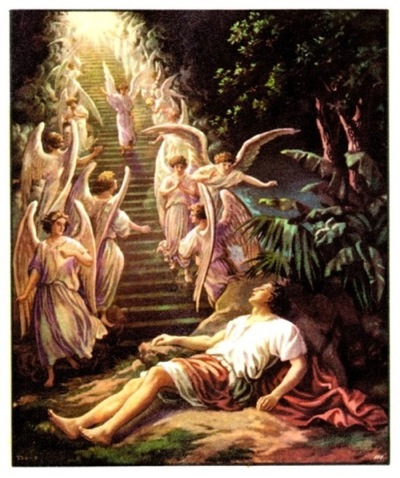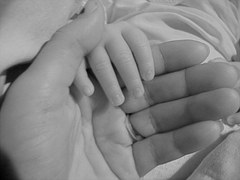How a Stone, A Ladder, and an Altar brought Jacob Nearer to God
Definitions:

Birthright: In Jewish custom and according to the Mosaic law, the birthright was given to the firstborn son of a man, whether or not he had a favorite son or more than one wife. The birthright gave the son the leadership role in the family after the death of the father; he became the “priest” of the family. (Deuteronomy 21:16-17). The recipient of the birthright inherited a double portion of all that the father possessed. Esau sold his birthright to his younger twin for a bowl of soup. (Genesis 25:29-34)

Blessing: a blessing was bestowed upon children when the patriarch of the family knew he was going to die soon. Jacob deceived his father into thinking he was the older brother, Esau. Isaac gave the blessing intended for Esau to Jacob, thereby making Jacob ruler over Esau.
The Story
Jacob is called the deceiver. He has sold his stew to his older twin brother Esau for the birthright. Then when his father wants Esau to go hunting and bring back meat so he can bless him, Jacob and his mother Rebekah connive a scheme so Jacob will also get the blessing. It works, but it costs him so much.
When Esau returns with his meat, he discovers Jacob has beaten him to the draw. Isaac, the father, blessed Jacob, placing him over his older twin.
That is why Jacob has to leave home. On the pretense of seeking for a wife, Rebekah convinces her husband to let Jacob leave home. In actuality, he is fleeing for his life because Esau has been heard to say that once their father dies, he will kill Jacob.
That is why Jacob is running for his life. As evening nears, he finds a place to rest. The biblical account tells us that he found a stone on which to lay his head. I rather wonder how that could possibly be comfortable, but apparently he felt it was better than nothing.

The Dream
During the night, Jacob has a dream. He sees an open stairway ascending all the way from earth to Heaven. Angels move up and down the ladder. The Lord appears at the top of the ladder and gives him a promise: “I am the God of your father Abraham and Isaac. I am your Father, and I will make of you a great nation. I am your God, and I will be with you wherever you go.” [Genesis 28:13-15]
What a promise to a man who has stolen and lied and cheated – a man who is running to save his own life. This man is heading to an unknown country and to a people he doesn’t know. What a promise to a man who has removed himself from God because of his lack of integrity and truth!
The man known as the Deceiver wakes up that morning, no longer a vagabond. He belongs. The Deceiver has a God who cares about him and has proven so in visiting him through that dream. He has a God who has given him a promise.
Jacob wakes up and wants to worship this God. Using the stone that was his pillow during the night, he builds an altar. Jacob pours oil on the altar and gives it the name Bethel [meaning: house of God, holy place]. I think it was Jacob’s way of coming back to God, of drawing nearer to Him.

A song for all of us
When we receive a word from the Lord, when we have an encounter with Him, then we also will want to worship Him. Our altar might be different from Jacob’s, but it’s an altar nevertheless. We might not see a ladder with angels ascending and descending; but if we listen, we will meet Him and hear His voice.
The song Nearer, My God, to Thee depicts this spiritual journey of Jacob. When we know the song was written to coincide with the scripture that tells this story, we can follow the story in the words.
Jacob is on a journey. In that journey, he is seeking to know God, to come closer to Him. In our journeys, God the Father of Abraham, Isaac and Jacob – God the Father of you and me – wants us to come nearer to Him as well.
When we can pray, “Nearer, my God, to Thee”, then He will meet us in our journeys as well. Read this story, then listen to this song. Envision your journey back to Him. No matter where you are, He will meet you at your altar of worship.
The Scriptures
You can read the Genesis account that tells this story here.
The Song
Nearer my God to Thee, nearer to Thee
E’en though it be a cross that raiseth me.
Still all my song shall be nearer, my God, to thee
Nearer, my God, to Thee, nearer to Thee.
Though like a wanderer, the sun gone down,
Darkness be over me, my rest a stone;
Yet in my dreams I’d be nearer, my God, to Thee
Nearer, my God, to Thee nearer to Thee.
Then let the way appear steps up to Heaven
All that Thou sendest me in mercy given.
Angels to beckon me nearer, my God, to Thee
Nearer, my God to Thee; nearer to Thee.
Then with my waking thoughts bright with Thy praise
Out of my stony griefs, Bethel I’ll raise.
So by my woes to be nearer, my God, to Thee
Nearer my God, to Thee; nearer to Thee.
Or if, on joyful wing, cleaving the sky,
Caught up to meet my King, swiftly I’ll fly;
Still all my song shall be nearer my God, to Thee,
Nearer, my God, to Thee, nearer to Thee.
The Author
This song (words and initial music) was written by Sarah Flower Adams (1805-1848), a British actress, in 1841. Her pastor was looking for a hymn for the following week’s sermon on Genesis 28:11-19 She offered to write the hymn and completed it within a week. Another tune was used later, and that music has been attributed to Lowell Mason, (1792-1872).
The Last Song on the Titanic
Most survivors of the Titanic remember that the orchestra played as people entered lifeboats. Many of them remember hearing this song being played. It is well possible that the last song that was played by the orchestra on the Titanic as it was sinking was this song, “Nearer, my God, to Thee.”
Listen to the song Nearer, my God, to Thee here.
This recording is sung acapella. I hope you will enjoy listening to the Sharon Mennonite Singers.
To hear Sounds Like Reign (Silo Sessions) sing this song, click here.







